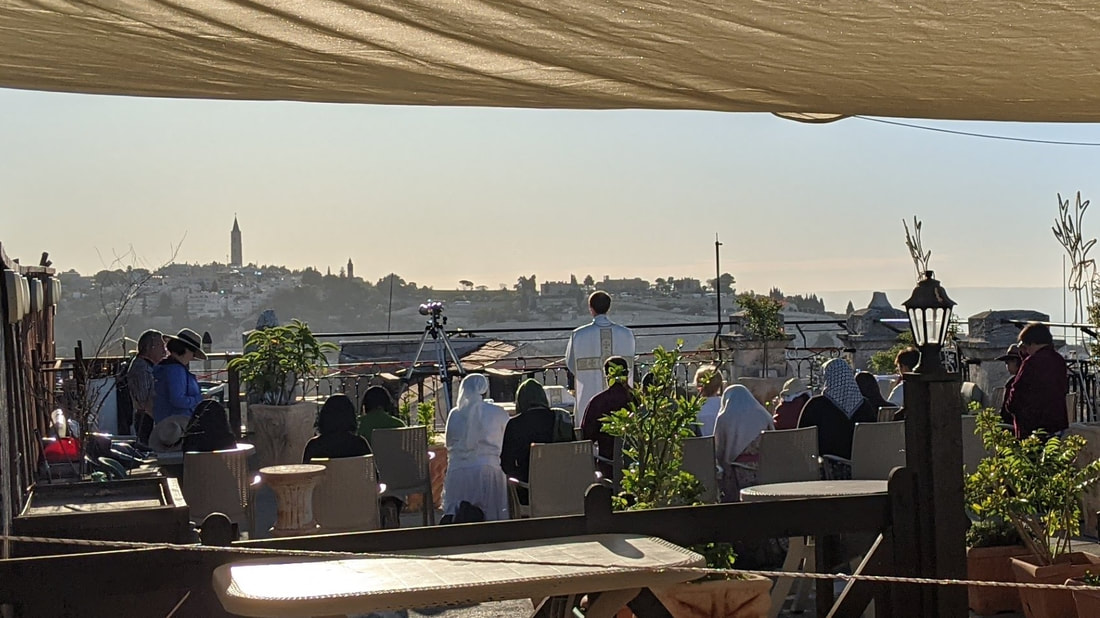Jerusalem Rises I stepped onto our porch to behold the Holy City rising up to meet the sun. Children are walking in twos and threes to the local school with bookbags in tow; shopkeepers—Muslim, Jewish, and Christian—are setting out their goods; taxi drivers are smoking cigarettes beside their cars; men old and young in broad-brimmed black hats and black leather satchels are walking serenely to begin the day’s study of the Torah; Israeli soldiers, the flower of Israel’s youth, walk with machine guns upright in their packs, chatting in groups; old men sit on chairs watching it all pass by and old women in headscarves mouth their morning prayers. It’s too early for tourists, but occasionally a pilgrim or two will walk past with a bible or rosary. Everybody is squeezed in with everyone else, in a city where people take religion seriously.
The City of Peace While there is a modicum of serenity in the city this morning, there is no deep peace in Jerusalem. Our tour guide, a Palestinian Christian from Bethlehem, slips into bitter comments about the suffering in his hometown. Bethlehem is essentially a ghetto now, he tells us, surrounded by a 20-foot wall. “The Jews have done to us what the Nazis did to them. The government cut off our water for 20 days last year,” he told me privately, “and only 8% of Bethlehem is still Christian. All the rest have been driven out of their hometown.” Muslim Palestinians respond to Israeli policies somewhat more aggressively than Christian Palestinians, shooting rockets from Gaza while Israeli jets reply with air attacks. Jerusalem, the “City of Peace,” the city that takes religion seriously, will never have earthly peace because religion is drama. “Religion” comes from the Latin word for “relationships,” and real relationships are a thing of the heart. “Love is stronger than death” the Scriptures tell us. As a Muslim terrorist once said to an CIA agent, “you people think money and politics is power. You are wrong. Belief is power.” Belief in a cause greater than ourselves is more powerful than any self-interest, and belief in a personal God is the most powerful force on earth. Here in Jerusalem, mutually-exclusive beliefs are in conflict, like tectonic plates moving past each other. The Islamic understanding of God can never be reconciled with the Jewish understanding of God, which can never be reconciled with the Christian understanding of Jesus Christ.
The Prince of Peace “In this world, you will have trouble, but take courage: I have overcome the world,” Jesus said. The “world,” the secular culture that distances itself from right worship, will always be in conflict with itself, and in conflict with the Church. Even the most faithful of Christians will engage in a lifelong inner conflict, for “the flesh and the spirit are at war with each other.” As you look out over your own lives—your marriages, your rectories, your work relationships, your parishes and your social communities—you wonder if you will ever find real peace in this world. The answer is no. We will attain little oases of peace, like the city street below me—school children with the bookbags walking beside soldiers with their machine guns. But the fullness of peace is for the next world. In this world, we have the Way of Peace, the Lord Jesus—and that is enough. Jesus is enough to get us through the wars of this life. Holding tightly to His hand, thirsting for His Word and hungering for His Sacraments, we are on the Way to Peace.



 RSS Feed
RSS Feed